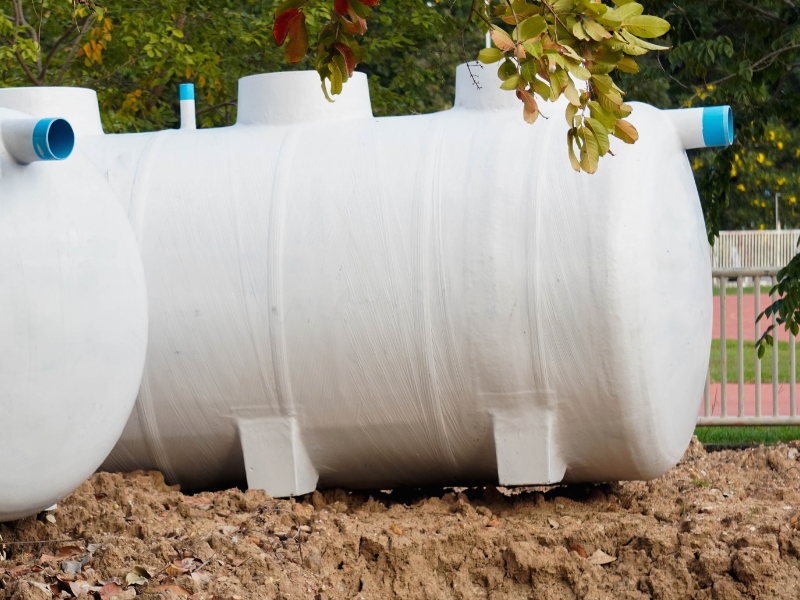Your Guide to Clean Cold Water Storage Tanks
July 17, 2025
Choosing, Maintaining & Testing Your System – Including Legionella Risk Assessments
Cold water storage tanks safeguard a consistent supply of clean water for homes, businesses, and industry alike. Yet, without proper water hygiene management, they can harbour harmful bacteria, most notably Legionella. This updated guide explains how cold water storage tanks work, the maintenance they require, and why every site needs a robust Legionella risk assessment programme to stay safe and compliant.
What Is a Cold Water Storage Tank?
A cold water storage tank (sometimes simply called a water tank) stores water for later use. Capacities range from modest residential units to large water storage tanks serving hospitals, factories or multi‑storey blocks. Typical materials include polyethylene, Glass Reinforced Plastic (GRP), stainless steel and concrete – all chosen for durability and resistance to contamination.
 How Cold Water Storage Tanks Work
How Cold Water Storage Tanks Work
Firstly, clean water is collected from a source such as a municipal supply, private supply or a rainwater harvesting system. The water enters the tank through a designated inlet pipe, often equipped with a screen or filter to remove any debris.
The tank itself is made from a durable material such as plastic, Glass Reinforced Plastic (GRP), concrete, or stainless steel to prevent leaks and contamination. These tanks come in various sizes depending on the level of usage, from small household dwellings to skyscrapers.
Each tank is equipped with an overflow pipe to ensure any excess water is discharged safely when the tank is full. Overflow systems often direct water to a designated drainage area or a secondary storage tank.
Water exits the tank via an outlet pipe, which is connected to either a booster pump or a gravity-fed system, ensuring that water pressure and flow are maintained throughout the property.
The water stored in clean cold water storage tanks is used for various purposes which can include drinking, kitchen taps, personal hygiene, dishwashers, washing machines, agriculture, industrial processes, firefighting, healthcare facilities, schools, public buildings, and much more.
Water Hygiene Management: Why Legionella Matters
Poorly maintained cold water storage tanks provide ideal conditions for Legionella proliferation. UK Health & Safety Executive (HSE) guidance insists that every duty‑holder undertakes a Legionella risk assessment – sometimes called a Legionella bacteria risk assessment – and repeats it regularly. Thorough Legionella risk assessments identify hazards, evaluate control measures and set inspection, cleaning and Legionella testing schedules.
Essential Maintenance & Testing Schedule
| Task | Minimum Frequency | Purpose | |
| Visual tank inspections | Annual | Check for damage, debris & stagnation | |
| Tank cleaning & chlorination | Annual (if supplying drinking water); otherwise, frequency depends on the condition of the tank | Remove biofilm, kill bacteria, and clear visible sediment | |
| Every 6 months (for drinking water tanks only) | Verify water quality & control measures | |
| Comprehensive Legionella risk assessment review | Annual or after system changes | Ensure ongoing compliance & safety |
*To ensure the highest level of accuracy and reliability, we work with trusted Legionella testing specialists.
Need help? See our water hygiene tests for full sampling and Legionella bacteria risk assessment services.
Key Benefits of Well‑Maintained Cold Water Storage Tanks
- Reliability – Maintain supply during mains failures, low pressure or peak demand.
- Flexibility – Store water for drinking, sanitation, irrigation or industrial processes.
- Efficiency – Harvest rainwater or retain treated water to reduce bills and environmental impact.
- Compliance & Safety – Regular cleaning, testing and documented Legionella risk assessments keep you aligned with HSE’s ACoP L8 & HSG274 guidance, protecting occupants and reputation.
Investing in the correct cold water storage tank is only half the story; ongoing water hygiene management, routine Legionella testing, and scheduled Legionella risk assessments are critical to keeping your supply safe.
Willow Pumps delivers end‑to‑end support – from installation of cold water storage tanks to comprehensive Legionella bacteria monitoring and risk assessment services. Contact us today to safeguard your water, your people and your compliance obligations.
 How Cold Water Storage Tanks Work
How Cold Water Storage Tanks Work